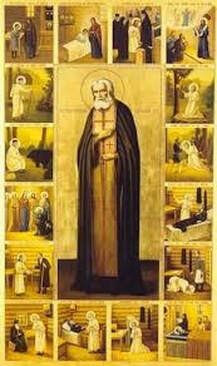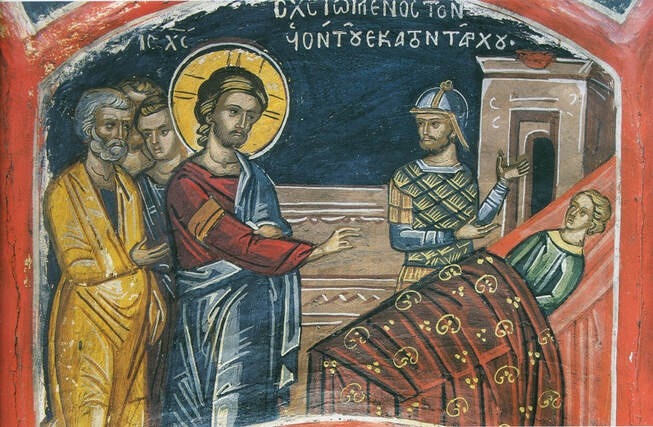 On this Sunday, we remember and honour St Seraphim of Sarov, one of the best known of Russian saints across the Christian world in both East and West. In his conversation with one of his spiritual children, Nikolai Motovilov, St Seraphim spelled out his understanding of the aim of Christian Life saying,” The true aim of our Christian Life is the acquisition of the Holy Spirit”. St Seraphim explained this. We as human beings, following Adam and Eve are spirit, soul and body; Adam was made thus from the dust of the earth like all other living creatures. Then God breathed into his face the Breath of Life, the blessing of the Holy Spirit proceeding from the Father; without this, Adam would not have completely exceeded all previous creations of God. Adam became the crowning of God’s creation on earth. Now, he possessed the Holy Spirit within himself; this raised him to the dignity of being in the image of God. In this exalted state Adam could indeed see the Lord walking in paradise and the fruits of the Tree of Life would guarantee that Adam and Eve and their offspring would have remained in this exalted position, Lords and Ladies, Kings and Queens of Creation. Adam, when given the Breath of Life, became a living soul, fully alike to God and forever immortal. This Breath of Life breathed into Adam’s face made him wise and knowing to the extent, “that there never was or ever will be a man more wise and knowing than he”. He was admired and obeyed by every creature, “He could comprehend God walking in the garden, he could comprehend all the words of the conversation of the Almighty with him, and the speech of the blessed angels, and the language of all animals, birds and reptiles on earth. Everything which today is hidden from us, as fallen sinful creatures, was for him clear until the Fall”. St Seraphim adds, “the same wisdom and all other blessings and holy qualities were also granted to Eve”. Adam and Eve, by breaking with God, gave up this priceless gift of God and this was so until the coming into the world of Our Lord Jesus Christ. However, the action of the Holy Spirit was fully and continually known to the human race as we see in the lives of Noah, Abraham, Moses, the Children of Israel coming out of Egypt and in the lives and understandings of the Prophets. Latterly, we see this in Simeon who received God into his arms at 40 days after his birth as a man, and the prophetess Anna and, of course, John the Baptist and Forerunner. The full restitution occurred when Our Lord completed His task of Salvation when He breathed on the Apostles and renewed the Breath of Life in them which had been squandered by Adam. He gave them the same grace of the Spirit of God that Adam had lost. Then, at Pentecost, the Holy Spirit entered them fully filling them with the power of Divine Grace. We have evidence of this in the driven apostolic lives they lived and as when St Paul said, “The ‘Holy Spirit went with us”. The Apostles were always instructed by the Holy Spirit about everything and acted accordingly. St Seraphim said to Motovilov, “Our lack of understanding occurs because of our lack of attention to matters concerning salvation...... because of this we do not understand the words of scripture as we should.....because we do not seek the grace of God and let it enter our souls..... thus, we do not have the enlightenment from above, from the Lord God which is sent into the hearts of those who hunger and thirst after His righteousness with their whole heart”. This fire inspired blessing of the Holy Spirit is given to all the faithful in Christ, in the sacrament of Holy Baptism when we are anointed with the Holy Chrism with the words, “The seal of the gift of the Holy Spirit”. This is the most precious gift we have ever received. If, after our baptism, we never sinned then we should be eternally holy, blessed, God-Bearing and pure; free of all impurity of body and spirit. We would be restored to all that Adam was before the Fall or rather all that Our lord Jesus Christ is. Even with our sinfulness, this transfiguration is not only available to us but is how we should be. It is the theosis so well proclaimed in our Orthodox faith. Hence, the goal of our Christian life consists in acquiring the Spirit of God and this, according to the teaching of St Seraphim, is the goal of every Christian who lives in a spiritual manner. There is so much more that can be said and I hope that you will be able to read The Aim of Christian Life, The Conversation of St Seraphim of Sarov with N.A. Motovilov (Saints Alive Press). The Epistle for St Seraphim’s feast, Galatians 5:22 to 6:2 helps us on our way: “ But the fruit of the Spirit is love, joy, peace, long-suffering, kindness, goodness, faithfulness, gentleness, self-control. Against such there is no law...... If we live in the Spirit, let us also walk in the Spirit...... (Let us ) bear one another burdens, and so fulfil the law of Christ”. We should also remember St Seraphim’s dictum: “My Joy! Acquire the Spirit of Peace and thousands around you shall be saved.” For our thoughts and instruction, Fr David
0 Comments
 I wonder what you would list if asked “What should you believe in?” That very question was asked in a recent survey, the result of which is as follows – 1. Yourself. 2. Others (the goodness of). 3. The power of kindness. 4. That this too shall pass. 5. Your inner strength. 6. Courage. 7. Hope. 8. Your influence on the world around you. 9. The truth. 10. The power of words. 11. Hard work. 12. Your goals and dreams. 13. Change. 14. Forgiveness. 15. Your power over your thoughts and feelings. 16. Learning. 17. Self-discover. 18. Fairness. 19. Humanity. 20. Peace. Now, I don’t know about you, but I find this list very disappointing; not least because belief in ‘self’ comes top! What we ‘believe’ is so very important!
If what we believe shapes our thoughts, and determines our perception of reality, then I think we can agree with A W Tozer that, “What comes into our minds when we think about God is the most important thing about us” I am sure we are all very familiar with today's gospel reading. We have all read, or heard, how a Roman centurion asks Jesus for his help because his servant is ill. Jesus offers to go to the centurion's house to perform a healing, but the centurion hesitates and suggests that Jesus' word of authority would be sufficient. Impressed, Jesus comments approvingly, “Verily I say unto you, I have not found so great faith, no, not in Israel.” The servant is then healed that same day. How did Jesus know this man, this Roman centurion had faith? When we truly believe in something, we think and act in ways to make it real. This is why the Apostle James tells us that “faith without works is dead” (James 2v26). So, what are the ‘works, which accompany the centurion’s faith. Well, He sought healing for his servant. This is an account of a person beseeching our Lord on behalf of another, resembling other Gospel events such as Jairus and the Syro-Phoenician women praying for their daughters (Mark 5:23; 7:24-30). These are accounts of intercessory prayer, intercession being a “supplication to God on behalf of another person.” To pray for others is the most critical skill we can learn. In fact, we cannot learn any higher form of prayer unless we learn to pray for others. This is because ardent, frequent prayer for others embodies two great virtues, love and faith. We are self-centred creatures; remember what came top of the most important things to believe! - and rarely think of others and even more rarely feel their pain, but our Lord knows it. We are called to become like our Lord, to have His heart. He cares for all people, at all times. We cannot claim to know God if we do not love, and according to the scriptures, we cannot love God unless we love our neighbour (1 John 4:20) We also express our faith when we pray for others, because we poor, weak creatures are afflicted with the delusion that we somehow can control things. The truth is, only God can heal, without God nothing is good. Praying for others contradicts and rebukes this foolish self-reliance. So, how can we learn and develop our intercessory prayer? There are practical and spiritual considerations. The most important consideration is that we make a commitment to pray for others, and value doing it as much as breathing. It is not always easy, and our passions and the ‘enemy’ will continually try to distract us. If we do not have a resolute heart, we will make very little progress. It can help if we make a list of people to pray for; family, friends, clergy. Absolutely, all of your enemies, and everybody you do not like, or have any estrangement with. Of course, the sick, and those for whom we have been asked to pray, together with all of members of our parish. Ideally, we should pray for everyone on the list, at least once every day. This should not be rushed. This is not about firing off a bunch of names after saying a few quick prayers in the morning or evening. We should give our intercessions the time and the environment they deserve When we intercede for others all we need do is ask for God’s mercy. Mercy, not in the legal sense but God’s mercy; His undeserved, freely given, unconditional love. And because of this, His love for us, He will help us in every way, but only if we ask, and if we try to live according to His will. The power of belief is, itself, something to believe in. When we believe in something, you think and act in ways to make it real. So, choose what you believe in carefully. The Orthodox Church firmly believes in the power of prayer and intercessions. Do you? |
Parish Blog
This mainly contains homilies and messages from our priests, although there is some scope to share thoughts and interesting articles which we may want to share with others Archives
October 2022
Categories |
 RSS Feed
RSS Feed